Become A Sponsor
|
Why Ads
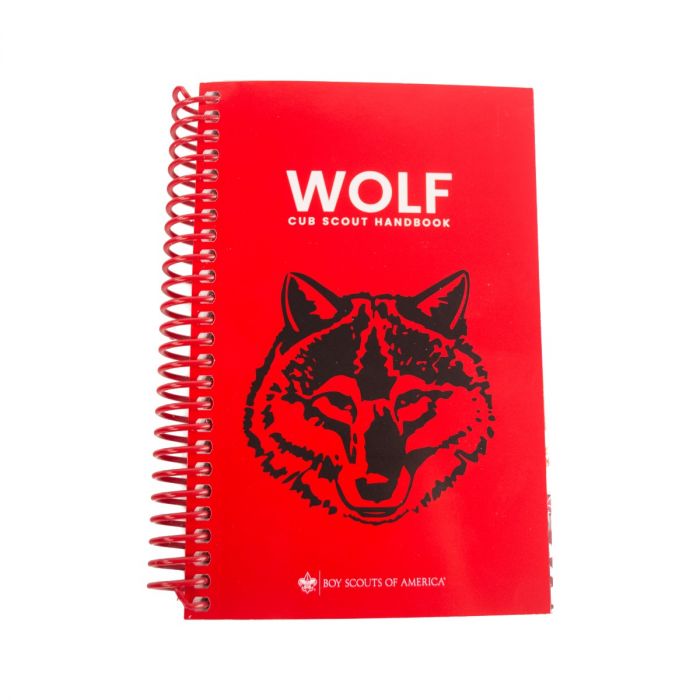 |
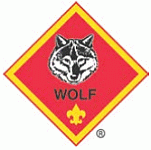
Wolf Elective Adventures
|
Requirements were
REVISED
effective
September 1, 2018 and in 2020.
To see the changes which were made,
Click here.
For the previous requirements,
Click here.
To see the changes which were made in 2022,
Click here.
To see the current requirements which took effect
on Jume 1, 2022, Click here.
Note: BSA originally published changes to Cub Scout advancement requirements
in late November, 2016, in the form of an on-line document listing the original
and proposed requirements. The revised requirements were later published
in addendum booklets to be inserted in the Cub Scout Handbooks for each
level until they could be revised and republished. The wording in the addendum
booklet was similar to, but did not exactly match the wording in the original
proposal. The wording shown below is in the current edition of the Wolf
Cub Scout Handbook which was issued in September, 2018.
In 2020, the Protect Yourself Rules and Yo-Yo
preview adventures were introduced.
In May, 2021, BSA announced that four of the Wolf
elective adventures will be retired on May 31, 2022.
There are 13 Elective Adventures, plus 2 Preview Adventures, which can
be earned as electives in the Wolf program. The Protect Yourself Rules preview
adventure can also be substituted for the Cyber Chip requirement.
Preview Adventures:
 |
Complete Requirements 1-4. Requirements 5-7 are optional..
- Identify different parts of a coin.
- Find the mint mark on a coin. Identify the mint where the
coin was made and the year it was made.
- Choose a coin that interests you, and make a coin rubbing.
List information next to the coin detailing the pictures on
it, the year it was made, and the mint where it was made.
- Play a game or create a game board with your den or family
where you can practice adding and subtracting coins.
- Play a coin game.
- Create a balance scale.
- Do a coin-weight investigation.
Workbook for use with these requirements:
PDF Format
DOCX Format
|
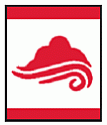 |
Complete the following Requirements.
- Conduct two of the following investigations to see how air
affects different objects:
- Make a paper airplane and fly it five times. Try to
make it fly farther by altering its shape. Fly it at least
five more times to see if your changes were effective.
- Make a balloon-powered sled or a balloon powered boat.
Test your sled or boat with larger and smaller balloons.
- Bounce a basketball that doesn’t have enough air in
it. Then bounce it when it has the right amount of air in
it. Do each one 10 times. Describe how the ball bounces
differently when the amount of air changes.
- Roll a tire or ball that doesn’t have enough air in
it, and then roll it again with the right amount of air.
Describe differences in how they move.
- Complete two of the following:
- With other members of your den, go outside and record
the sounds you hear. Identify which of these sounds is the
result of moving air.
- Create a musical wind instrument, and play it as part
of a den band.
- With an adult, conduct an investigation on how speed
can affect sound.
- Make a kite using household materials. With your den
or family, explain the rules for safely flying kites. Fly
your kite.
- With your family, den, or pack, participate in a kite
derby, space derby, or rain gutter regatta. Explain how
air helps the vehicle move.
Workbook for use with these requirements:
PDF Format
DOCX Format
|
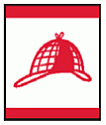 |
Complete the following Requirements.
- Complete two of the following:
- With the members of your den or family, make a game
with simple materials that requires math to keep score.
- Play a game of “Go Fish for 10s.”
- Do five activities at home, at school, or in your den
that use mathematics, and then explain to your den how you
used everyday math.
- Make a rekenrek with two rows, and show your den leader
or other adult how you would represent the numbers 4, 6,
9, and 14.
- Make a rain gauge or some other measuring device, and
use it.
- Complete one of the following:
- With other members of your den or family, identify three
different types of shapes that you see in nature.
- With other members of your den or family, identify two
shapes you can see in the construction of bridges.
- Select a single shape or figure. Observe the world around
you for at least a week, and write down where you see this
shape or figure and how it is used.
- Complete one of the following:
- With your den, find something that comes with many small,
colored items in one package. Count the number of items
of each color in your package. Keep track of each color.
Then:
- Draw a graph showing the number of items of each
color.
- Determine what the most common color is.
- Compare your results to those of the other Scouts.
- Predict how many items of each color you will find
in one more package.
- Decide if your prediction was close.
- With your den or family, measure the height of everyone
in the group and see who takes more steps to walk 100 feet.
- Have each member of your den shoot a basketball. Count
the number of shots it takes for each scout to sink five
baskets. Make a graph that shows how successful your den
was. Your graph should show each group that needed 5, 6-10,
11-15, 16-20, and more than 20 tries to sink their shots.
- Complete one of the following:
- Use a secret code using numbers to send a message to
one of your den members or your den leader. Have that person
send a message back to you. Be sure you both use the same
code.
- Send a message to another member of your den or your
den leader using the pig pen code or another code that changes
letters into special shapes.
- Practice using a code stick to create and decode a message.
Workbook for use with these requirements:
PDF Format
DOCX Format
|
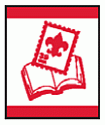 |
Complete the following Requirements.
- Begin a collection of 10 items that all have something in
common. Label the items and title your collection.
- Share your collection at a den meeting.
- Complete one of the following and tell your den what you
learned:
- Visit a show or museum that displays different collections
or models.
- Watch a webcast or other media presentation about collecting
or model building.
- Complete one of the following:
- Create an autograph book, and get 10 autographs. Start
with members of your den.
- With your parent’s or guardian’s permission, pick a
famous living person, and write him or her a letter. In
your letter, ask the person to send you an autographed photo.
Workbook for use with these requirements:
PDF Format
DOCX Format
|
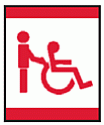 |
Complete at least four of the following Requirements.
- With other members of your den, try using a wheelchair or
crutches, and reflect on the process.
- Learn about a sport that has been adapted so that people
in wheelchairs or with some other physical disability can play,
and tell your den about it.
- Learn about “invisible” disabilities. Take part in an activity
that develops an understanding of invisible disabilities.
- With your den, try doing three of the following things while
wearing gloves or mittens:
- Tying your shoes
- Using a fork to pick up food
- Playing a card game
- Playing a video game
- Playing checkers or another board game
- Blowing bubbles
- Draw or paint a picture two different ways: Draw or paint
it once the way you usually would and then again by using a
blindfold. Discuss with your den the ways the process was different.
- Use American Sign Language to communicate either a simple
sentence or at least four points of the Scout Law.
- Learn about someone famous who has or had a disability,
and share that person’s story with your den or family.
- Attend an event where people with disabilities are participants
or where accommodations for people with disabilities are made
a part of the event.
Workbook for use with these requirements:
PDF Format
DOCX Format
|
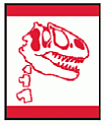 |
Complete the following Requirements.
- Play a game that demonstrates your knowledge of dinosaurs,
such as a dinosaur match game.
- Create an imaginary dinosaur. Share with your den its name,
what it eats, and where it lives.
- Complete one of the following:
- Make a fossil cast.
- Make a dinosaur dig. Be a paleontologist, and dig through
a dinosaur dig made by another member of your den. Show
and explain the ways a paleontologist works carefully during
a dig.
- Make edible fossil layers. Explain how this snack is a good
model for the formation of fossils.
Workbook for use with these requirements:
PDF Format
DOCX Format
|
 |
Complete the following Requirements.
- Do the following:
- Using a map of your city or town, locate where you live.
- Draw a map for a friend so he or she can locate your
home, a park, a school, or other locations in your neighborhood.
Use symbols to show parks, buildings, trees, and water.
You can invent your own symbols. Be sure to include a key
so your symbols can be identified.
- Do the following:
- Identify what a compass rose is and where it is on the
map.
- Use a compass to identify which direction is north.
Show how to determine which way is south, east, and west.
- Go on a scavenger hunt using a compass, and locate an object
with a compass.
- Using a map and compass, go on a hike or walk with your
den or family.
Workbook for use with these requirements:
PDF Format
DOCX Format
Maps which can be used for part of requirement 2:
PDF Format
|
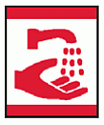 |
Complete at least five of the following Requirements
- Wash your hands while singing the "Happy Birthday" song
- Play Germ Magnet with your den or your family. Wash your
hands afterward.
- Conduct the sneeze demonstration.
- Conduct the mucus demonstration with your den or family.
- Grow a mold culture. At a den or pack meeting, show what
formed.
- Make a clean room chart, and do your chores for at least
one week.
Workbook for use with these requirements:
PDF Format
DOCX Format
|
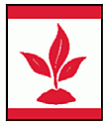 |
Complete the following Requirements
- Select a seed, and plant it in a small container. Care for
it for 30 days. Take a picture or make a drawing of your plant
once each week to share with your den or family.
- Find out the growing zone for your area, and share the types
of plants that will grow best in your zone.
- Visit or research a botanical or community garden in your
area, and learn about two of the plants that grow there. Share
what you have learned with your den or family.
- Complete one of the following:
- Make a terrarium.
- Using a seed tray, grow a garden inside your home. Keep
a journal of its progress for 30 days. Share the results
with your den or family.
- Grow a sweet potato plant in water. Keep a journal of
its growth for two weeks. Share the information with your
den or family.
Workbook for use with these requirements:
PDF Format
DOCX Format
|
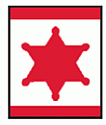 |
Complete the following Requirements:
- Talk with your family or den about what it means to you
to be a hero. Share the name of someone you believe is a hero.
Explain what it is that makes that person a hero.
- Visit a community agency where you will find many heroes.
While there, find out what they do. Share what you learned with
your den.
- With the help of a family member, interview one of your
heroes, and share what you learn with your den. Tell why you
think this person is a hero.
- Complete one of the following:
- As a den or family, honor a service member by sending
a care package along with a note thanking them for their
service.
- With your family or den, find out about animals that
are trained to help others in your community.
- Participate in or create an event that celebrates your
hometown hero(es).
Workbook for use with these requirements:
PDF Format
DOCX Format
|
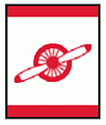 |
Complete the following Requirements:
- Do each of the following:
- Create and fly three different types of paper airplanes.
Before launching them, record which one you believe will
travel the farthest and what property of the plane leads
you to make that prediction.
- Make a paper airplane catapult. Before launching a plane,
record how far you believe it will travel and explain what
information you used to make this prediction. After you
make your prediction, launch the plane and measure how far
it flies.
- Make two different model boats and sail them. Choose different
shapes for your boats.
- Create a model car that moves under its own power.
Workbook for use with these requirements:
PDF Format
DOCX Format
|
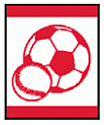 |
Complete at least Requirements 1-4. Requirements 5-7 are optional.
- Talk with your family or den about what it means to be physically
fit. Share ideas of what you can do to stay in shape.
- With your family or den, talk about why it is important
to stretch before and after exercising. Demonstrate proper warm-up
movements and stretches before and after each activity you do
that involves action.
- Select at least two physical fitness skills and practice
them daily for two weeks. See if you can improve during that
time.
- With your family or your den, talk about what it means to
be a member of a team. Working together, make a list of team
sports, and talk about how the team works together to be successful.
Choose one and play for 30 minutes.
- With your den, develop an obstacle course that involves
five different movements. Run the course two times and see if
your time improves.
- With your den, talk about sportsmanship and what it means
to be a good sport while playing a game or a sport. Share with
your den how you were a good sport or demonstrated good sportsmanship
in requirement 4.
- Visit a sporting event with your family or your den. Look
for ways the team works together. Share your visit with your
den.
Workbook for use with these requirements:
PDF Format
DOCX Format
|
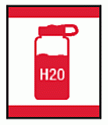 |
Complete the following Requirements
- Discuss how the water in your community can become polluted.
- Explain one way that you can help conserve water in your
home.
- Explain to your den leader why swimming is good exercise.
- Explain the safety rules that you need to follow before
participating in swimming or boating.
- Visit a local pool or public swimming area with your family
or den. With qualified supervision, jump into water that is
at least chest-high, and swim 25 feet or more.
Workbook for use with these requirements:
PDF Format
DOCX Format
|
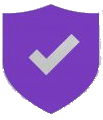
Protect Yourself Rules |
Complete each of the following:
- Watch the Protect Yourself video lessons for this adventure.
- Demonstrate how you would say "No!" to someone who is doing
something that makes you feel uncomfortable.
- Identify five trusted adults, and share this list with your
parent or legal guardian.
- Describe the characteristics of a "safe stranger."
Workbook for use with these requirements:
PDF Format
DOCX Format
|

Yo-Yo |
Complete each of the following:
- Learn the safety rules of using a yo-yo and follow them
at all times.
- Using a real yo-yo string, a regular string, or a piece
of yarn, show how to find the proper yo-yo string length for
you.
- Explain why it is important to have the correct string length
and to be in the right location before throwing a yo-yo.
- Demonstrate how to properly string a yo-yo and how to create
a slip knot.
- In an area where there are no hazards or other people, conduct
the pendulum experiment with a yo-yo. Explain what happens to
the yo-yo when the string is short compared to when the string
is longer.
- Show that you can properly wind a yo-yo.
- Demonstrate the gravity pull trick with a yo-yo.
Workbook for use with these requirements:
PDF Format
DOCX Format
|
Sources: Wolf Cub Scout Handbook (#34752 - SKU 646428)
https://www.scouting.org/programs/cub-scouts/preview-adventures/protect-yourself-rules/
https://www.scouting.org/programs/cub-scouts/preview-adventures/yo-yo/
and
https://blog.scoutingmagazine.org/2021/05/13/nineteen-cub-scout-elective-adventures-will-be-retired-next-year/
Page updated on:
September 12, 2022
|
























